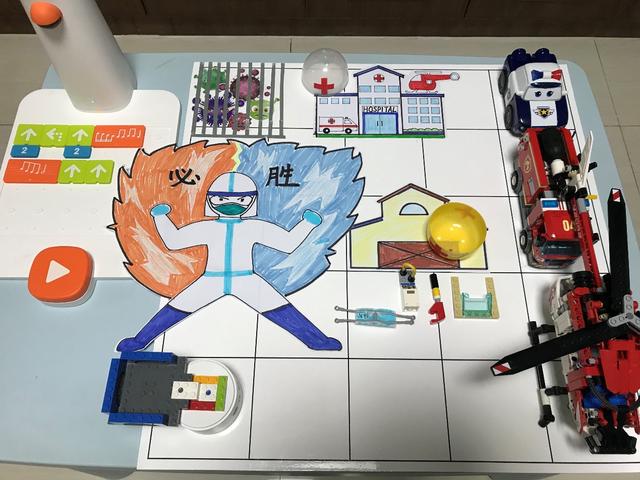In April 2020, the month-long "Fight Against the Coronavirus with Matatalab” Online Robotics Competition was successfully concluded in China. Hundreds of 4-7 year-old kids from all over the country participated in the competition and demonstrated their awareness and understanding of, as well as their solutions to, the COVID-19 pandemic through coding.
Fight Against the Coronavirus with Matatalab through coding
As the pandemic raged in the first half of 2020, in order for kids to continue to gain new knowledge and take new challenges at home, Matatalab planned the Online Robotics Competition themed "Fight Against the Coronavirus with Matatalab”. The competition was divided into three phases: Phase I “Eliminate the Virus”, Phase II “Move Materials” and Phase III “Design Public Medical Solutions”. Task difficulty increased at each phase. Participants needed to design their work for the competition using Matatalab coding robots and their ideas.

During the competition, hundreds of kids proposed their solutions, such as contactless transport of supplies by robots, building hospitals and detecting infected persons, etc. through creative coding skills. Some kids came up with various innovative ideas. In their submissions, not only the theme “Fight Against the Coronavirus” was concerned, but also elements from the Four Great Classical Novels of Chinese literature were included.

To the same task, there was no standard solution as the participants’ stories and ideas, the scenarios they built and the coding processes may vary greatly. As the complexity of stories increased, so did the complexity of coding. Some kids even used Lego sensors to complete their tasks and extend their creativity.

Behind coding are their problem-solving abilities
In the era of artificial intelligence, as a tool for communication between humans and computers, coding serves as the technological foundation of artificial intelligence. However, coding education does not aim to train all students as programmers, but instead to cultivate their problem-solving abilities behind coding. In this competition, these young players learned to disassemble big problems into a series of small and easily-handled ones, unleashed their creativity and applied computational thinking in understanding the pandemic and proposing solutions.

Coding works by young players
From the very start of our company, Matatalab has been dedicated to providing kids around the world with cognitive and creative technology tools, and has encouraged them to use technology to create works as a way to gain problem-solving abilities. The kids’ outstanding performance in this competition confirmed the value of our approach.
Matatalab screenless tangible coding is better for young kids
The Matatalab coding robot is designed for kids aged 3-9. It adopts a screenless tangible coding design, allowing kids to learn coding and build their computational thinking as they use their hands and brains. To date, Matatalab has entered more than 50 overseas markets including the United Kingdom, Germany, France, the United States, Singapore, South Korea, Brazil, and Russia, etc. and has developed more than 1,000 online and offline retail stores. More than 5,000 kindergartens and elementary schools around the world now use Matatalab products as their coding tools.

In China, with its product advantages and a rich variety of courses, Matatalab has sold products to thousands of kindergartens and training institutions, and has established strategic partnerships with well-known channels such as Tongcheng Tongmei, Semia and Sooper Builder, etc.